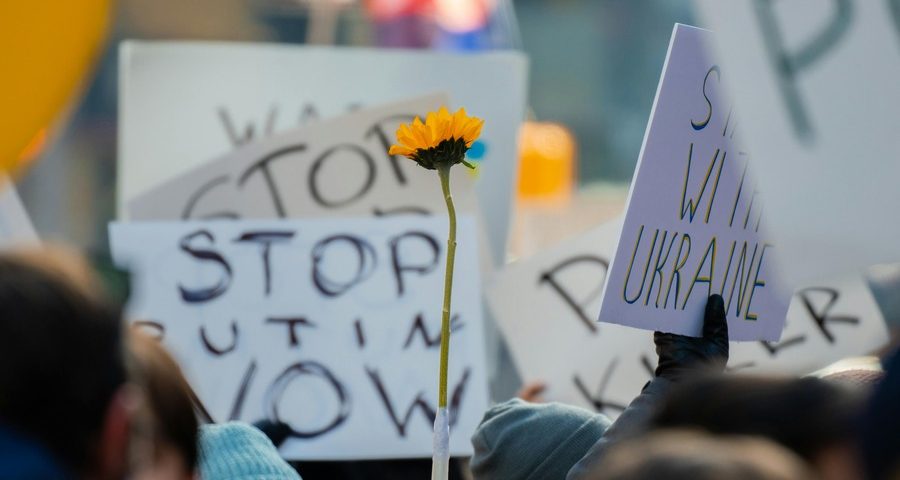
Emily Ding: Starting up a successful legacy programme at Canal & River Trust
September 10, 2025
Sanna Kotiranta: “DEI Turncoats” – Defending diversity when it’s out of fashion
December 10, 2025September’s European Fundraising4Democracy Tour showcased campaigns from across the continent that illustrated how fundraising, crowdfunding, and civic action are defending democracy, with tips for mobilising supporters and raising funds for democratic causes. Featuring speakers from seven countries, including Slovakia, Germany, Finland, and Poland, the event drew participants from across 19 nations.
Civic space is being eroded across Europe, and with this civil society is increasingly under attack. Threatening the foundations of democracy, this crisis is unfolding against a global backdrop marked by rising inequality, wars, and the escalating impact of climate change. At the same time, we see the rise of the far-right, nationalism, and polarisation, truth becoming harder to discern, and nonprofits being portrayed as ‘agents of evil’. To survive, civil society must regroup, and rethink strategies to find ways of responding to these new and challenging realities.
Here’s some inspiration, with six key takeaways from EFA’s recent European Fundraising4Democracy Tour.
- Turn crisis into opportunity
Some nonprofits are successfully turning attacks into opportunities, using them to mobilise supporters and open doors. For example, Greenpeace International has been targeted by multiple SLAPPs (Strategic Lawsuits Against Public Participation) from oil giants. It’s used these attacks to rally support, with a responsive global campaign team and centrally produced fundraising and mobilisation materials that can be adapted locally helping Greenpeace organisations raise millions and strengthen solidarity. Consequently, it’s currently using the EU’s new anti-SLAPP law to challenge one oil giant, Energy Transfer, in the Dutch courts.
“We’ve aligned our fundraising with the spikes of public attention that come with the big verdicts and media coverage, and by combining those earned media moments with rapid, coordinated fundraising, we’ve seen the strongest engagement,” said Global New Supporters & Fundraising Lead Russell Harvey. “Every SLAPP, every attack, is meant to silence us, but we’ve shown that people power can turn intimidation into fuel. When we’re under attack, our movement doesn’t shrink, it grows stronger.”
- Mobilise & build momentum
Successful campaigns share four key traits: a clear call to action, resonant storytelling, collaboration, and tangible goals. As Rally’s Paul de Gregorio said: “To combat the threats we all face, we need to be able to inspire action from as many people as possible. One way to do this is to focus heavily on our target action, to think about how we can create entry-level actions that appeal to a broad set of people with values in common.”
Finland’s first large-scale Women’s Day March in 2025 saw three feminist NGOs collaborate, led by Finnish Women’s Association Unioni. Uniting people to fight the gender backlash, they inspired action by drawing on changes taking place under the Trump administration and sharing stories of surviving harassment. Aiski Ryökäs, Finnish Women’s Association Unioni, said: “This took place when Google had removed dates like Women’s Day from its calendar. We tapped into this with messages like ‘you can erase calendars, but you cannot erase a movement, are you with us?’, and worked our socials to build this idea of a movement and build the momentum.”
Combining the three NGOs’ resources and ensuring a strong social media presence helped achieve reach and engagement. Over €16,000 was fundraised in just over a month for the march, while 131 organisations and 10,000 people took part.
Similarly, the ‘Slovakia is Europe’ movement mobilised 100,000 people in 50 cities and raised €220,000 by turning frustration against the Fico government into collective action. The key to this movement’s success was showing people that together, their individual actions had a big impact. “Instead of weakening us, attacks open doors – to greater media reach, invitations to protest. We have something stronger than fear: trust, vision and support,” noted Lucia Štasselová, Peace for Ukraine Civic Association.
- Turn short-term action into long-term support
Attacks on democracy can spark waves of public support that result in ‘revenge giving’. But this surge often fades as emotions cool, particularly when donors are motivated by a cause rather than a specific organisation.
Some Polish NGOs working on democracy, human rights, and minority support have successfully transformed this short-term momentum into steady, long-term support. Andrzej Pietrucha from Fundacja Akademia Organizacji Obywatelskich (FAOO) explained how: “It requires clear systems and processes to collect donor data with proper consents and to encourage regular giving; and defining the problem your organisation addresses in the long run. It’s very important to frame the cause beyond one emotional moment.” Poland’s Batory Foundation achieved this with a clear message: “If you support the foundation, you support democracy.” This framing helped them turn an initial investment of under €22,000 into an annual return of €440,000–€550,000.
Encouraging longer-term support also requires relationship building, as ComingOut discovered when it launched a storytelling campaign to share the lives of LGBTQ+ people in Russia. The campaign reached 700,000 people but collected just €280, with ComingOut’s Georgy Kalakutskii noting, “We learned that fundraising takes time. It’s about building a lasting relationship with the audience. You’ve got to build a foundation, to make sure that people know and understand you, and only then start asking for money and other input.”
- Shift from defence to vision
Activism is often about reacting, but there must also be a focus on driving longer-term positive change. Civil society needs safe spaces to imagine these new possibilities. Unhack Democracy’s REWIRE incubator in Hungary is doing just that – leveraging the collective wisdom of citizens, and using neuroscience, art, and entrepreneurship to help activists move from defending democracy to reimagining it.
“There can be no change without a new mindset and radical imagination. We need to break the rules like artists and build a new system like entrepreneurs because we cannot just keep fighting for the status quo of democracy as it is,” said Unhack Democracy’s Zsofia Banuta. “By 2030, we aim to help 100 nonprofits in Europe activate 1 million citizens to become engaged community members and resources of intelligence, imagination, and money for democracy.”
Projects incubated by Unhack Democracy in 2025 include Impossible Conversations – a workbook for navigating difficult dialogues, and CrossCover – a cultural collective tackling social issues.
- Inspire participation & engagement
When budgets are limited, nonprofits must find creative ways to activate interest and participation. Social media amplifies calls to action and inspires support as shown by the Finnish Women’s Day March and Slovakia is Europe. Other successful strategies include using humour, influencers, and authentic voices: as used by Slovakia’s Donio platform in campaigns that have successfully raised over €2m for Ukraine, and over €46k in support of the Slovak Media Monitor. “We can use humour to build emotional connection and to fight misinformation, and public figures to help draw attention. We can also ask influencers to multiply our voice and donations,” said Donio’s Zuzana Suchová.
It also pays to think laterally. Familiar fundraising methods like crowdfunding can bring in more than donations – providing a route to building awareness, trust, and participation. “Crowdfunding is a way for us to engage and activate, to build awareness about a topic or project, to fund projects – and to do it all transparently,” said Valeria Vitali, Rete del Dono.
- Build resilience & sustainability
Restrictive laws, reduced funding, and challenging environments make bolstering organisational resilience and sustainability essential. Diversifying funding, forming new partnerships, and working with supporters and beneficiaries helps with both.
While some funding streams are shrinking or disappearing altogether, significant opportunities remain – including through foundations abroad that support democracy and make funding available to organisations operating elsewhere. “Don’t rely solely on local funding,” said Erik Detiger, Philantropia BV. “There are 200,000 foundations in the US and 170,000 in Europe – plus many more worldwide. Some fund democracy, and it doesn’t all stay in-country. This international perspective can provide security – funding from other countries may not be as easy to influence by the government where you work.”
Partnerships and alliances are vital for amplifying collective influence and providing protection and legitimacy. By working together – pooling expertise, resources, and advocacy power – CSOs can strengthen their collective voice and resilience against political or financial pressure. Detiger added: “Not only is there strength in numbers but what’s also important is the protection this offers – partners can provide a shield.”
Listening to donors, and co-creating projects with supporters and beneficiaries from the outset also brings better results. This approach transforms project ideas into impactful movements that attract donor and community support as well as funding, build relevance, and strengthen democracy from the ground up. “Deliberative processes lead to stronger decisions and greater legitimacy, so we need real listening, co-creation, and to show results,” said Eva Mejtová, GrantHub. “Then participation becomes real, and outcomes last.”
The way forward
As the world changes, so too nonprofits have to change. This means restructuring the narrative to nonprofits as defenders of solidarity, democracy and human rights. Fundraising can no longer be just about raising money – now it’s about empowerment, and strengthening organisations, especially the small, the marginalised and the emerging.
By necessity then, nonprofits must also become more political: to campaign for democracy and rights, and defend truths under attack.
“Democracy is easier to defend than to rebuild once destroyed,” said Martin Georgi, Deutscher Verband Fundraising. “Civil society must regroup, respond and reimagine itself in order to empower people, sustain organisations, and defend democracy. We are all facing a situation where we need to think anew. It’s time to take on new tasks and challenges, to find new people, partners, and techniques to strengthen fundraising as a method not just to raise money, but to empower organisations.”
For more insights and actionable takeaways from EFA’s European Fundraising4Democracy Tour, catch up with the presentations here.
Picture by Derek French on Pexels



